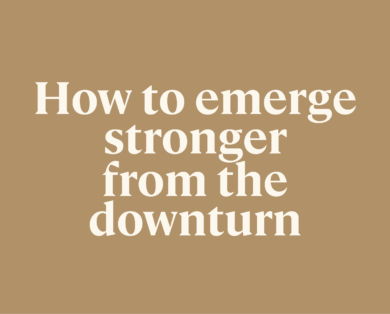- 24 July, 2024
POINT OF VIEW
Finding Calm In Crisis: Coping With Stress, Anxiety and Isolation
How do you stay calm, keep your mind clear, and build resilience in the face of crisis?
The rapid spread of COVID-19 has disrupted our lives in unexpected ways. Many of us are now working from home, isolated from our team and facing uncertain times ahead. Combined with the onslaught of alarming headlines every day, the situation is taking a toll on our mental wellbeing.
Last week, we held a digital fireside chat with organisational psychologist and mental health at work specialist, Melissa Doman, M.A., to talk about the importance of maintaining good mental health hygiene and techniques to cope with stress, anxiety, and isolation.
Our aim was to share practical advice on developing positive habits and building resilience in these difficult times. Here I’d like to share some of the key insights from my conversation with Melissa.
How do we stay informed without getting overloaded with information?
- Find the right balance for you: it is not realistic to do a total digital detox under the current circumstances but checking the news frequently will also drain you. Start with a plan of checking maybe once or twice a day for set time. Personally, I tune into the news once a day for a maximum of 30 minutes a day.
- Set Boundaries: once you schedule your ‘tune in’ time, stick to it and hold yourself accountable.
- Disconnect when possible: it is unhealthy and unnatural for our brain to be wired in all the time but unfortunately, we are increasingly find it difficult to unplug. You have to be strict with yourself about disconnecting when possible.
How does fear affect our behaviour?
A crisis can generate a lot of fear and anxiety. This often pushes people into a fight or flight response, which can result in unusual behaviour. In this case, for example, behaviours such as stockpiling or fights breaking out in shops.Overexposure to alarming news can send our amygdala into hyperdrive and when that happens, people will naturally panic and can go into toxic survival mode. This also causes a spike in the stress hormones and reinforces a negative emotion loop (e.g. perceiving your life is in immediate danger, focusing on the worst-case scenario, feelings of being trapped, etc.). If you’re not aware of these physiological responses to fear and how it impacts your decision making, you’re likely to act in an irrational and self-preserving manner.So it is important to become aware of how your body is responding to the news and the stimuli in the environment. Then you can use the techniques we will discuss to calm your mind down.
What are the practices you recommend for coping with stress and anxiety of this crisis?
- Remember your circles of influence and control – this is a concept introduced by Stephen Covey explaining the importance of being proactive and focusing on things within your control. You can find a good explanation of the exercise here.
- Scan your body – this is a way for you to check-in with your body, from head to toe and release any trapped tensions. Here’s a great overview of this practice from Headspace.
- Go on a guided visualisation – this is a simple but powerful technique you can use anytime you feel overwhelmed to relax and find calm. It is a way for you to transport yourself in your mind to a serene and calming place, a place either in your memories or your imagination. Once there you allow yourself to immerse in the experience much like being in a dream state. Here’s a short video-guided visualisation you can try.
- Take deep diaphragmatic breaths – we all need to breathe to live but many of us are chest breathers. Here’s a breathing technique that helps calm your body in just a few minutes.
- Develop (and stick to) mental wellbeing non-negotiables – whether it’s reading, running, cooking, or dancing, we all have an activity we enjoy doing that energises and revives us. It’s important that you develop and stick to the practice of this activity and when circumstances make it difficult or impossible to practice, see if you can adapt it to the new situation or switch to another that has the same effect. If you can’t go running for instance, could you find an indoor exercise routine you can do to the same music?
- Reframe thoughts – write down unhelpful, scary, or negative thoughts that are buzzing around in your head and reframe them into a more helpful realistic or positive thought. (see a practical guide here)
- Be mindful – find moments in your day to appreciate and fully notice your surroundings. Engage all your senses and become fully present in the current moment, letting go of the past and the future.
- Release unhelpful thoughts – give yourself permission to let go of thoughts that don’t serve you in the moment.
- Laugh – good hearty laughter reduces pain, relieves physical tension and stress, leaving your body feeling relaxed.
How effective are these coping techniques?
Negative emotions are natural and we have them for a reason. It’s unreasonable to expect to be able to flip a switch and feel 100% calm. These techniques, if practised regularly and consistently, can help take the edge off and give you more control over your thoughts.It’s also important to remember these are not going to be an instant fix. You need to build a consistent routine and keep practising. Some days your body will respond better than other days, key things to stick with your routine.The other key thing that helps is using these practices to get yourself into a calm enough state to get a good sleep at night. Rest is vital to building resilience.
Negative emotions are natural and we have them for a reason. It’s unreasonable to expect to flip a switch and feel 100% calm.
What advice can we give to managers who are leading teams through this crisis?
- Remember to take care of yourself – though it is important to be there for your team, you won’t be able to support them unless you’re also looking after yourself.
- Encourage your team to develop their own self-care techniques and learn to cope.
- Open a channel for them to express mental health concerns so they can get the support they need
- Advocate for setting structure and boundaries – working from home makes it even harder to maintain a healthy work-life balance. It’s important for people to stick to the same hours and maintain routines of showering, getting ready, taking a proper lunch hour, and starting/ending the day at a reasonable time.
- Be a good role model – have video on for calls, and be dressed for them, don’t send emails at 1 am or on weekends, be open and honest about the challenges, and share things that are working for you.
- Accept that your team members’ psychological safety feels threatened (health, job safety, when will ‘normal’ return, etc.), check in with them and listen to their concerns.
- Be more than a line manager, be a human and connect with them on that level.
- Be reassuring but don’t paint a rosy picture – glossing over the tough reality, will make you seem either dismissive or disconnected and they will lose their confidence in you.
- Admit when you don’t have the answers – more than ever this is the moment to be honest when you don’t have all the answers. Remind people that no one really has all the answers in this situation but show that you care and are doing everything you can to address their concerns.
- Build a support system around you – being a manager or leader, it’s a lonely job, and in moments like this, you need as much support as you can get.
About Melissa Doman, M.A.
Following years of clinical work as a mental health therapist in employee assistance counselling, private practice, and universities – Melissa left the clinical sector and turned her focus to the worlds of organisational psychology and mental health awareness in local and global companies. Learn more about her on her website.











